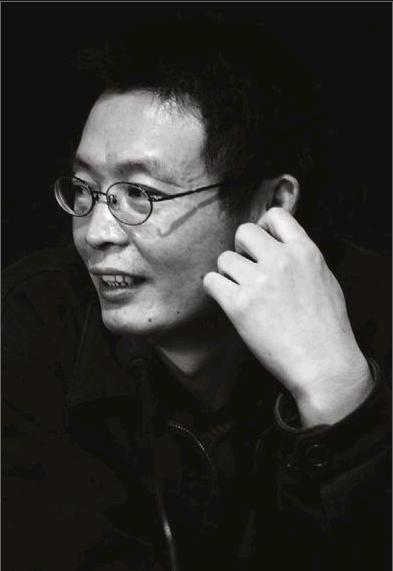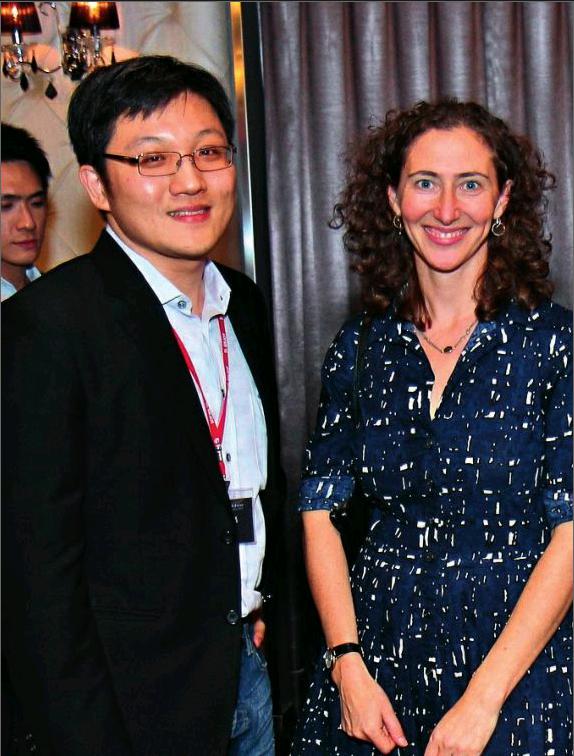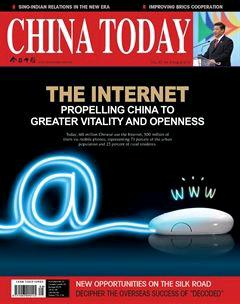Decipher the Overseas Success of“Decoded”
By+staff+reporter+LIU+YI


EARLY in 2014, the Chinese spy thriller, which the New York Times Book Review declared “truly is a page turner,”captured the international book market. Published in 21 countries, including Britain and the U.S., Decoded, the English translation of Mai Jias Jie Mi, broke international records for Chinese authored works, and made 17th ranking in the Amazon list of U.S. fiction best-sellers. The shot of Mai Jia, chin cupped in hand beaming a piercing bespectacled gaze, is now a staple item in English language media book review columns. A writer who avoids bright-light publicity, Mai Jia has been labeled the “Dan Brown of China.”
Decoded is an account of the meteoric rise and Icarus-like fall of math genius Rong Jinzhen. Twice adopted and afflicted by autism, the protagonist becomes a cryptographer by chance, and dedicates his talents to the nation. Having pulled off extraordinary feats of code breaking, Rong Jinzhen crumbles into insanity after losing the notebook containing his cryptographic calculations and conclusions relating to an extraordinarily indecipherable code.
First published in 2002, Mai Jias debut novel Decoded has won him fame and laurels. After its adaptation into a TV series he became a household name in China. It was not until a dozen years later that Decoded, Olivia Milburn and Christopher Paynes translation of Jie Mi, elevated Mai Jia to the ranks of best-selling authors. New York publisher FSG (Farrar, Straus, and Giroux) agreed to pay Mai Jia an unheard of 15 percent in royalties, conditional upon sales of a nominal 10,000 copies of Decoded, and gave him an advance of US $100,000 on his next work.
“This level of royalties and advance is the highest I have ever witnessed during my ten or more years in the copyright business,” Mai Jias overseas copyright agent Tan Guanglei said. “Chinese writers generally receive between six and eight percent.” Tan is president and founder of the Taipei-based Grayhawk Agency. Since establishing their business relationship in 2010, Tan has recommended 14 Chinese novels to FSG, but none made it to press. But when FSG read Jie Mi, they couldnt wait to publish it, and even signed a contract for Mais second novel An Suan (Plotting in the Dark).
Mai Jias accomplishment has without doubt stimulated the Chinese literature market. Chinas book trade has long been in deficit. In 2003, introduced copyrights outnumbered 15-fold those exported. The ratio gradually improved to 1.9:1 in 2012, but exports have been limited to books on traditional Chinese medicine, ancient books, paintings and calligraphy, to destinations like Chinas Hong Kong, Macao, Taiwan, and South Korea and Japan, where Chinese culture traditionally radiates.endprint

The Wests keen response to Mais thriller is, of course, due to its compelling ingredients of suspense, family saga, code-cracking and modern Chinese history – a combination that conjures a fascinating story. But the books “unexpected” success also owes much to two key elements – the translator and the agent. “Decoding” these two links will likely help familiarize international readers with more good works of Chinese fiction.
Delayed Flight Produces Superb Translator
In 2010, Olivia Milburn, a teacher of Chinese language at Seoul National University of Korea, went to the Shanghai World Expo. Her flight was delayed for three hours, so she went to the airport bookstore and bought Jie Mi and An Suan. Both had been on prominent display for the previous five years due to the formers TV adaptation. But this was entirely lost on Milburn, an Oxford graduate in ancient Chinese language who had no knowledge of contemporary Chinese literature.
It was the cryptological aspect that drew Milburn to Jie Mi. Her grandfather worked for British intelligence during World War II, and came into contact with (posthumously) celebrated cryptanalyst Alan Turing, who broke the Enigma code. Milburn translated a few chapters to send to her grandfather for his enjoyment.
Olivia Milburn and Christopher Paynes translation is precise and concise but at the same time imbued with classicism and verve. Readers can imbibe the innately mysterious and poetic tension of Mai Jias original text through its translators apt and skilled reflection of it. “This strange, twisting tale is told in fizzy, vivid and often beautiful prose,” reads The Economist review in March titled “The Chinese Novel Everyone Should Read”, with the subheading “FINALLY, a great Chinese novel.”
As The Economist review mentions, the past 35 years have seen an abundance of excellent fiction in China. Owing to the paucity of translators working from Chinese to English, however, foreign publishers, not to mention readers, seldom see them. “Translation is the second round of creation,” Mai Jia said in a recent interview. “Translators can upgrade a mediocre novel to one that is first-class, and also can ruin a classic work.”
Xie Wenge, better known by his pen name Da Xie, does not share Mai Jias luck. Vice director of the Writers Association of Hebei Province, in 2012 Da Xie tried to find a translator into English of his 200,000-character poem Bei Ge (The Lament), but failed to find anyone willing to take on this massive task. Eventually one translator agreed, but for a fee of RMB 800 per 1,000 Chinese characters – about four times the standard rate for Chinese to English translation and way beyond what Da Xie could afford.endprint
Chinese Writers Association is clearly aware of this problem. In September 2013, the organization and China International Publishing Group jointly held the first-ever Chinese International Translation Contest. As of the end of March, 1,006 translations of the 20 selected short novellas had come in from more than 30 countries and regions. They hope to discover among participants another Milburn and Payne.
Literary Agent – A Vital Component
Mai Jias other piece of good fortune is his copyright agent. He has admitted that he knew nothing about copyright agents until Tan Guanglei contacted him. Also that even if he could have afforded to bear the costs of translation, he wouldnt have known where to start.
In China and throughout Asia, writers contact publishing houses directly. But in the U.S. and Britain, the market is big and mature enough to allow work specialization, in the form of literary agencies. Agents seek out quality manuscripts, help authors find suitable publishers and negotiate contracts, and assist in promotion of works. They also act on a writers behalf in dealing with film and TV copyright, overseas copyright and derived copyrights (such as large print and audio books), leaving authors to concentrate on their creations.
Tan started working as an agent in 2004. He then established his own company and imported best-sellers like The Kite Runner and The Shadow of the Wind. But in 2009 he decided to promote Chinese novels on the international market. “When dealing with copyright exports, you need to understand the rules of the international publishing market, and also the system of discourse power and human network,” Tan said.“Entering the Western book industry is an arduous process.”
Tan has set up cooperation relationships with literary agencies in 16 countries. He sends specifically translated sample chapters and outlines of quality books to agencies with whom he cooperates. These companies, in turn, evaluate the materials and send them to publishers they know. They then arrange meetings and negotiations. “These are basic procedures,” Tan explained. “Whether or not they succeed is often a matter of pure luck.”
Tan began promoting Jie Mi abroad at the end of 2009. After more than a year of no responses, things suddenly fell into place. In early 2011, Milburn contacted Tan and sent him her sample translation. Tan rapidly re-compiled the materials and sent them, through a literary scout in Britain, to the chief editor of the Penguin Press, who immediately signed a contract for the English edition. In 2012, the English translation was finished. Tan sold the U.S. edition copyright to FSG, and followed up in 2013 with the copyright deals for Spanish, Turkish, French and Hebrew editions. The floods of rave reviews that followed publication in 2014 of the English edition made clinching deals with other countries a formality.
Thus far, most literary agents – in China and throughout Asia – are actually “sub-agents.”They generally purchase Chinese-edition copyrights from foreign publishers, in effect importing foreign copyrights. There exists only a handful like Tan, who proactively search out Chinese writers and successfully recommend them to the Western publishing world. But Tan has confidence in the overseas market for Chinese literature. “The success of Decoded has opened the gates to the international market for Chinese writers,” Tan said. “Foreign publishers that have previously not published Chinese works might now be keen to try, because they love this story. Others might still hesitate, but eventually be bold enough to follow suit.”
Decoded is likely to attract swarms of book scouts and publishers to China, prospecting for literary “gold.” Chinese authors, meanwhile, now know that the road to success lies in a competent translator and a reliable agent!endprint

